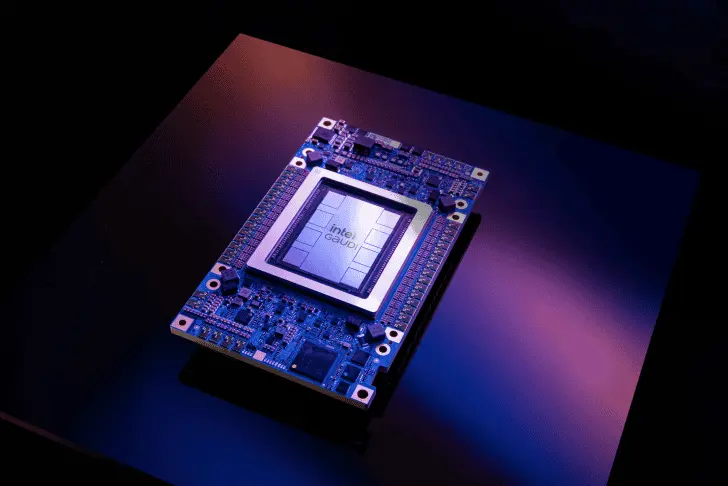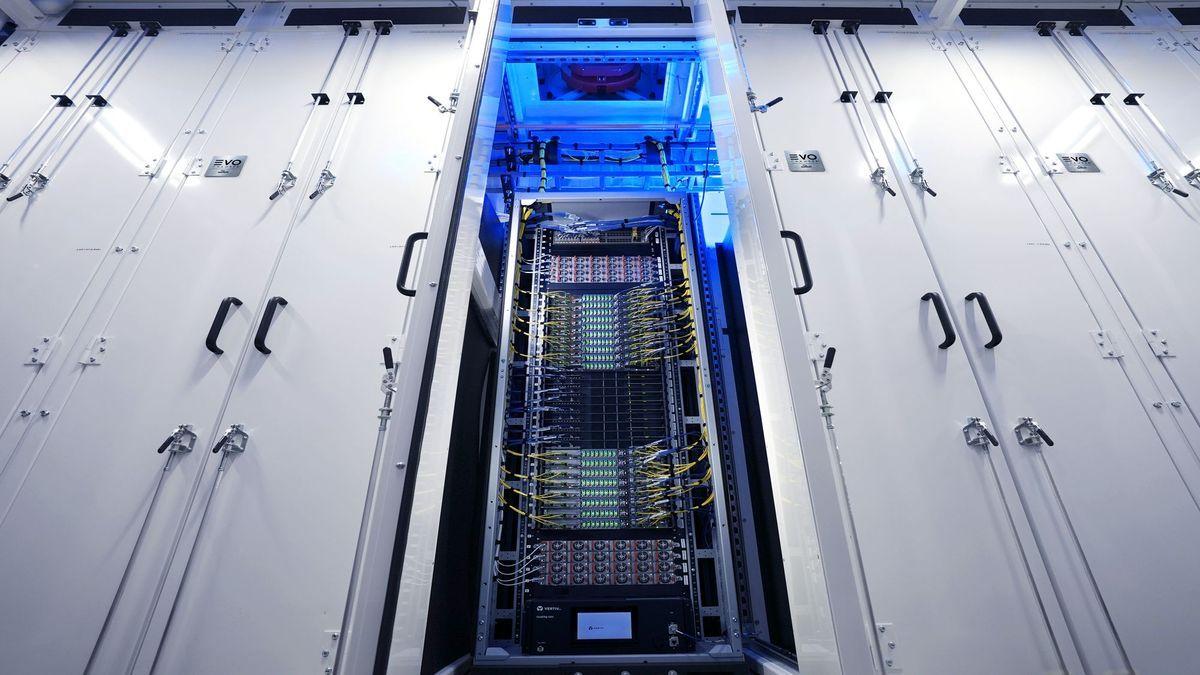Dell Pioneers Integration of Intel's Gaudi 3 AI Chips in PowerEdge Servers
2 Sources
2 Sources
[1]
Intel's Gaudi 3 AI Chips Secure Integration in Dell's PowerEdge Servers, Marking One of the Few Wins for the Struggling Lineup
Intel's Gaudi 3 AI chips have seen a rather 'rare' feature from Dell's PowerEdge AI servers, which are claimed to be cost-efficient and scalable. When it comes to Intel's AI business, it is indeed the slowest of competitors, mainly because the firm was late to the party and, more importantly, couldn't keep up with the likes of NVIDIA and AMD at all. When other GPU manufacturers were relying on the AI frenzy for their revenues, Intel took a sluggish approach, which is why its Gaudi AI lineup didn't see widespread adoption from CSPs, apart from a few occasions. Now, in a press release by Dell, it is revealed that the Gaudi 3 AI chip has been featured in Dell's PowerEdge XE7740 server, being one of the first major firms to offer the configuration. The XE7740 server offers eight PCIe accelerators, supports 8x Gaudi 3 AI chips in a single configuration, and offers a 1:1 networking interface, allowing flexible integration within a server-based system. The PowerEdge XE7740 features ready support for modern-day AI models, which includes Llama4, Llama3, Deepseek, Phi4, Qwen3, Falcon3, and more. Dell hasn't shared any performance figures yet, but here's what the company claims is the advantage of employing Intel's Gaudi 3 AI chips in their system: While it is undoubtedly exciting to see Intel's Gaudi 3 featured by a mainstream CSP, it wouldn't be wrong to say that Team Blue still has a long way to go when it comes to launching a competitive product in the AI segment. More importantly, with Falcon Shores being canceled, the next big release would likely be Jaguar Shores, as confirmed by Intel. And with that particular lineup, one could expect Intel to compete more aggressively with AMD/NVIDIA, since Jaguar Shores will be the first rack-scale solution as well.
[2]
Dell Technologies Says It's First To Bring Intel's Gaudi 3 PCIe To Market
Dell is first in bringing Intel's latest AI accelerators to market inside a server that can house eight Gaudi 3 PCIe, which cost less and draw about half as much power as the market leading GPUs. Dell is first in bringing Intel's latest AI accelerators to market inside a server that can house eight Gaudi 3 PCIe, which cost less and draw about half as much power as the market-leading GPUs. Dell said the Gaudi allows for fast inferencing, silicon diversity, and capital expense management for enterprises leveraging AI workloads. The Gaudi accelerators have a thermal design power rating of 600 watts, according to Intel's spec sheets compared to Nvidia's Blackwells, which are rated at 1,200 watts, according to that manufacturer. The Round Rock, Texas-based Dell said the Gaudi 3 can come installed on the Dell PowerEdge XE7740 rack server, a 4U device that is capable of fine-tuning AI models for specific workflows, and run high-performance inferencing, Dell stated in a press release. [RELATED: Intel: Partners Will Play 'Massive Role' In 2025 Gaudi 3 AI Chip Rollout] The XE7740 can accommodate up to eight Gaudi 3 PCIe accelerators in either a double-wide, or a four-way bridged configurations. Dell said accelerator-to-accelerator bridging is critical for large scale AI models and larger memory requirements in order to maintain workflow scalability and flexibility. The server can also deliver flexible networking with one network interface card or NIC per accelerators, and Open Compute Project networking that can provide frictionless integration into existing infrastructure, Dell said. The XE7740 uses Dell "smart cooling" technology and is designed for air-cooled racks while providing enough horsepower to run Llama4, Llama3, Deepseek, Phi4, Qwen3, Falcon3, and other models. The Gaudi 3 PCIe accelerators integrate with PyTorch and platforms like Hugging Face, enabling organizations to fine-tune models or infer complex AI models efficiently, Dell said. In an interview with CRN last year, Michael Green, who became the head of Intel's new North America partner scale group in November 2024, said the company's channel partners are going to be key to the company winning market share as the company made the Gaudi 3 available to Dell, Hewlett Packard Enterprise, SuperMicro, and its making its own server. "The channel plays a massive role in how do we take Gaudi 3 out to the masses," he added. "But if you go from Gaudi 2 where we had one OEM partner to now having four, it's massive progress. So then how do we take that and make it more applicable to the channel partners? In our strategy, it will just take a little bit of time." Dell is the worldwide market leader in selling servers and during its most recent quarter, it delivered record server and networking revenue of $12.9 billion, up 69 percent, year over year. "We've now shipped $10 billion of AI solutions in the first half of FY26, surpassing all shipments in FY25. This helped deliver another record revenue quarter in our Servers and Networking business, which grew 69 percent," said Jeff Clarke, vice chairman and chief operating officer, Dell Technologies, in prepared remarks ahead of the company's August 29 earnings call. "Demand for our AI solutions continues to be exceptional, and we're raising our AI server shipment guidance for FY26 to $20 billion dollars." Since the AI goldrush kicked off, Dell has touted its close relationship with AI GPU kingpin Nvidia. Similar to its announcement on Wednesday, Dell was also first to market when it delivered a server with Nvidia's GB300 NVL 72 to AI hyperscaler CoreWeave in July.
Share
Share
Copy Link
Dell Technologies becomes the first to market with servers featuring Intel's Gaudi 3 AI accelerators, marking a significant step for Intel in the competitive AI chip market.

Intel's AI Chip Integration Breakthrough
Intel's Gaudi 3 AI chips have achieved a significant milestone with their integration into Dell's PowerEdge servers, marking a rare win for the tech giant in the competitive AI accelerator market
1
. This development comes as Intel strives to catch up with industry leaders like NVIDIA and AMD in the AI chip sector.Dell's PowerEdge XE7740: A Game-Changer for AI Workloads
Dell Technologies has announced that it is the first to bring Intel's latest AI accelerators to market with its PowerEdge XE7740 server
2
. This 4U rack server is designed to accommodate up to eight Gaudi 3 PCIe accelerators, offering a powerful solution for AI workloads1
2
.Key features of the PowerEdge XE7740 include:
- Support for 8x Gaudi 3 AI chips in a single configuration
- 1:1 networking interface for flexible integration
- Double-wide or four-way bridged configurations
- Dell's 'smart cooling' technology for air-cooled racks
Gaudi 3: Cost-Efficient and Power-Saving Alternative
The Gaudi 3 AI chips present a compelling alternative to market-leading GPUs, boasting lower costs and significantly reduced power consumption. With a thermal design power rating of 600 watts, Gaudi 3 chips draw about half as much power as NVIDIA's Blackwell GPUs, which are rated at 1,200 watts
2
.AI Model Support and Integration
The PowerEdge XE7740 server with Gaudi 3 chips offers ready support for modern AI models, including:
- Llama4
- Llama3
- Deepseek
- Phi4
- Qwen3
- Falcon3
The Gaudi 3 PCIe accelerators integrate seamlessly with PyTorch and platforms like Hugging Face, enabling organizations to fine-tune models and perform complex AI inferencing efficiently
2
.Related Stories
Intel's AI Strategy and Market Position
While this integration represents a positive step for Intel, the company still faces challenges in the AI chip market. Intel's late entry and slower approach to AI have resulted in limited adoption of its Gaudi AI lineup by cloud service providers (CSPs)
1
.However, Intel is not backing down from the competition. With the cancellation of Falcon Shores, the company is now focusing on Jaguar Shores as its next major AI chip release. This upcoming lineup is expected to be Intel's first rack-scale solution, potentially allowing the company to compete more aggressively with AMD and NVIDIA
1
.Dell's AI Market Leadership
Dell Technologies, as the worldwide market leader in server sales, has been capitalizing on the AI boom. In its most recent quarter, Dell reported record server and networking revenue of $12.9 billion, up 69% year-over-year
2
. The company has already shipped $10 billion worth of AI solutions in the first half of FY26, surpassing all shipments in FY252
.As the AI market continues to evolve, the collaboration between Intel and Dell could potentially reshape the competitive landscape, offering customers more diverse and efficient options for their AI infrastructure needs.
References
Summarized by
Navi
Related Stories
Recent Highlights
1
ByteDance Faces Hollywood Backlash After Seedance 2.0 Creates Unauthorized Celebrity Deepfakes
Technology

2
Microsoft AI chief predicts artificial intelligence will automate most white-collar jobs in 18 months
Business and Economy

3
Google reports state-sponsored hackers exploit Gemini AI across all stages of cyberattacks
Technology








